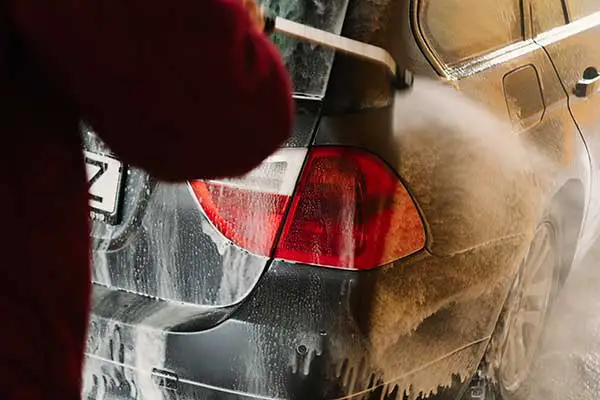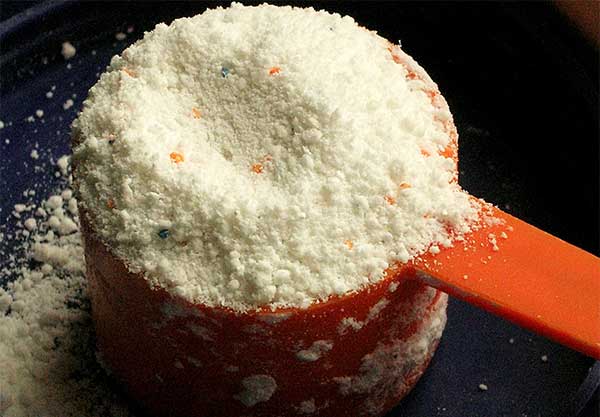Pressure washers are amazing at cleaning, but sometimes you will need a little extra oomph.
There are lots of cleaning agents that you can DIY at home and some that are commercially available too. There is no one size fits all answer here, as there are many different products designed with different functions in mind.
The inclusion of soap into your pressure washer massively increases its cleaning abilities. This can enter the water either before or after it has traveled through the pump.
Soaps v detergents

You would be forgiven for thinking these are the same thing, as the terms are often used interchangeably. This is not the case.
Detergents will contain a larger quantity of synthetic (man-made) chemicals. These are designed with specific usages in mind, such as the dissolution of grease or the elimination of the mold. These substances are often much harsher and have the potential to cause harm to the environment and wildlife.
Soaps are much more natural and tend to be created primarily from oils and fats. These are mixed in either a hot or cold process with an alkaline solution.
Soaps are more biodegradable than detergents and can safely be rinsed into the gutters without a second thought. However, if you are using soap with untreated water (like rain) then a solid layer of calcium carbon will form on the top.
What are some common ingredients and their uses?
Ammonia – often found in glass and stainless steel cleanersBleach – a combination of sodium hydroxide and sodium hypochlorite, used as a stain remover, disinfectant, and sanitizerCitric acid – used on concrete, wooden patios, and to remove stainsOxalic acid – used on rust and for general cleaningPotassium hydroxide – this is included to turn a solid, soft soap into a liquidSodium hydroxide – Dissolves grease and fats, commonly used on glass and steelSodium hypochlorite – used on stains and as a disinfectantVinegar – used on countertops, brass, bronze, windows, and food
Dish soap
This will work in your pressure washer, but it may not be as effective as other cleaners. If you are planning on using dish soap for your pressure washer then you should ensure you correctly dilute it.
This is because if you add too much, you may end up with a stream of bubbles instead of water. A good ratio is 3 ounces of dish soap to every 1 gallon of water.
Dish soap may not be the most cost-effective cleaner and is not particularly well suited to being used on cars. It can also leave a filmy residue on some surfaces if it is not rinsed off correctly. Dish soap that is used in too high a concentration can also cause blockages or damage inside the pressure washer.
Water
In some situations, you will not have a need for chemical cleaners. For many cleaning tasks, hot water in your pressure washer will do the job perfectly.
We suggest testing a small area of your cleaning project using just water. This will allow you to ascertain whether just water will be sufficient.
If using only water is enough, you will have saved yourself money and will not be introducing any new chemicals into the environment.
White vinegar
To use this, you will need to make a solution that is 3 parts of white vinegar and 7 parts water. In other words, the ratio should be roughly a cup and a half of vinegar per gallon of water used.
Vinegar is a great natural cleaner as it has deodorizing and disinfecting properties that cut through dirt and bacteria. If the vinegar smell is too overwhelming for you, a few drops of your favorite essential oil can be added to neutralize this.
Laundry detergent
This is a much more effective cleaning agent to use in your pressure washer than dish soap. It is much stronger and will remove the dirt better.
Any laundry detergent will work, but if you are looking for an environmentally kind option, we recommend using a phosphate-free one.
To create the ideal dilution for your pressure washer, combine ½ cup detergent for every 1 gallon of water used.
Household detergent
These are found in almost every household and are commonly used to disinfect surfaces or clean up spills. They are almost always safe to be used in your pressure washer to increase their cleaning ability.
To make a solution for use in your pressure washer, combine 1 ounce of straight detergent with 1 cup of water. If you are working with a deeply set stain, you may want to increase the concentration of the detergent. If your job is smaller, you can decrease the concentration as required.
Bleach
It is not recommended to use bleach or other corrosive cleaning agents in your pressure washer. This is because the corrosive elements could build up inside the machine and cause long-term damage.
As water leaves the pressure washer there is a small amount of kickback, particularly if you are operating it in a breeze. This can cause a mist spray to blowback from the pressure washer and on to you. If this happens when there is bleach in the machine, it could cause skin, optical, or respiratory issues.
If you feel like bleach is necessary to reach the standard you are aiming for, we suggest applying it separately. Add the bleach to the surface and work it in well. You can then use your power washer on a low setting to rinse off the bleach residue and leave your surface clean.

Pressure washer cleaners
There are a huge number of cleaning agents designed specifically for use in pressure washers.
Each of these has a different purpose. To name a few, you can get vehicle, concrete, fence and deck, mold, siding, and multipurpose cleaners.
The additional benefit of using a cleaning solution like this is that you do not need to worry about your pressure washer being damaged.
They are designed to give you the best clean possible but with no damage to the machine itself. The same cannot be said of all of the other options.
Related Articles:
You might also like our article on choosing the best car pressure washer.
